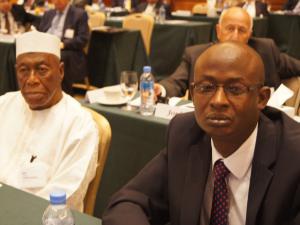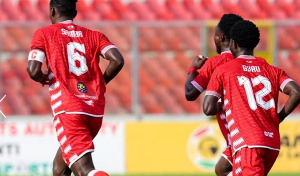Existing Intellectual Property (IP) laws are to be harmonised to curb perennial infringement of locally manufactured textile designs and compositions, and protect the intellectual rights of individuals.
Intellectual property concerns any form of original creation that can be bought or sold. With the four central ones being patents, trademarks, designs and copyright, among others.
Emmanuel Doni Kwame, Chief Executive, World Trade Centre, Accra said the draft Intellectual Property policy is ready and the Ministry of Trade and Industry will soon launch it so it becomes official. This will harmonise all I.P laws in the country.”
Speaking on the sidelines of a new initiative by the Ghana Employers Association (GEA), dubbed “Advocacy to Combat Counterfeit and Illicit Trade”, said the IP reform is necessary for the speedy resolution of intellectual property rights disputes, and heightened intellectual property protection.
There is the need to establish a harmonised anti-counterfeit legal framework with effective punishment to serve as a real deterrent to those involved in counterfeiting, Doni Kwame said.
Ghana current has a Copyright Office purposely to ensure the effective administration of copyright and related rights in the country. However, the law governing intellectual property is fragmented across various sectors.
For instance, there is the Copyright Act, 2005; the Trade Marks Act 2004, and Industrial Design Act, 2003 among others.
The draft IP legislation is designed to harmonise the laws on Intellectual Property and lead to a reduction in pirated and counterfeit products on our market and boost investor confidence in doing business in Ghana.
“It will improve the operations of manufacturers especially those in the textile/garments and pharmaceuticals and lead to an effective management of owned copyrights and trademarks,” Doni Kwame said.
Copy right infringement is wide-spread in the country, especially the music, textile and pharmaceutical industries among others.
Registered designs of textile manufacturers in Ghana is easily copied reprinted in some Asia countries and brought as cheap smuggled good into the country--eroding the market share and profit margin of local producers and pushing them out of business.
The pharmaceutical industry has also had to grapple with the menace. Counterfeit drugs are neatly packaged in fake packaging and sold on the open market.
While waiting for the harmonisation of the laws, we are embarking on a campaign dubbed “fake costs more” to tell Ghanaians to buy only original products.
Busac Fund is providing GH¢77,000 financial support, with the GEA contributing 10 percent of the amount to support the initiative.
The GEA has so far held a sensitisation workshop in Accra for all stakeholders and is scheduled to organise another in the Ashanti Region shortly.
Business News of Tuesday, 29 July 2014
Source: B&FT
Gov’t to harmonise intellectual property laws
Entertainment












